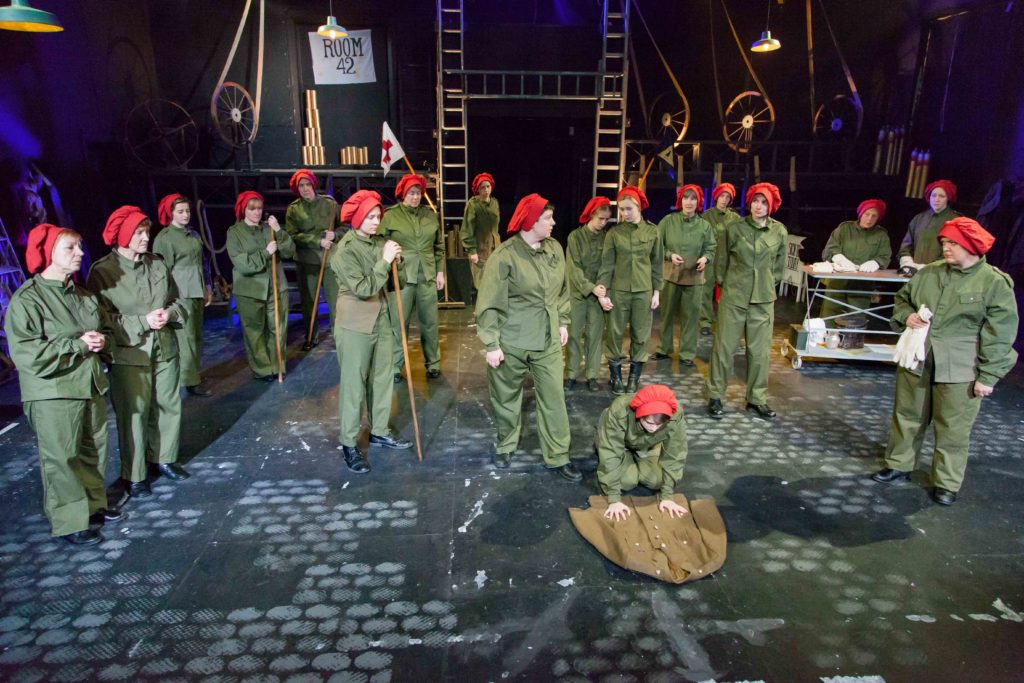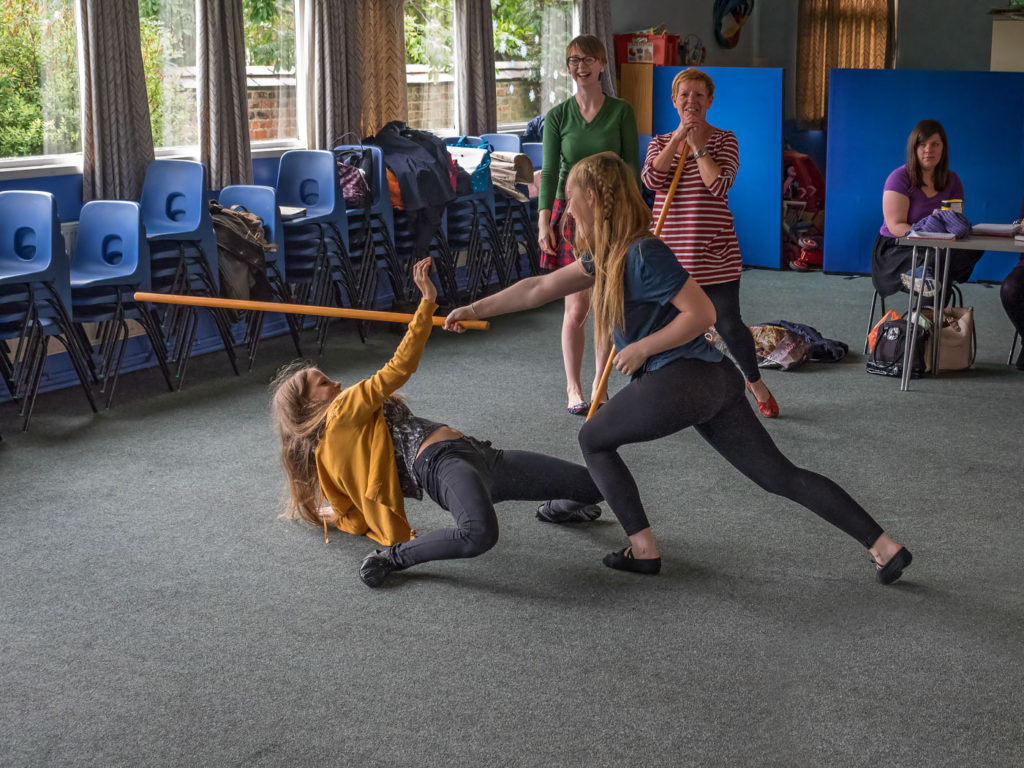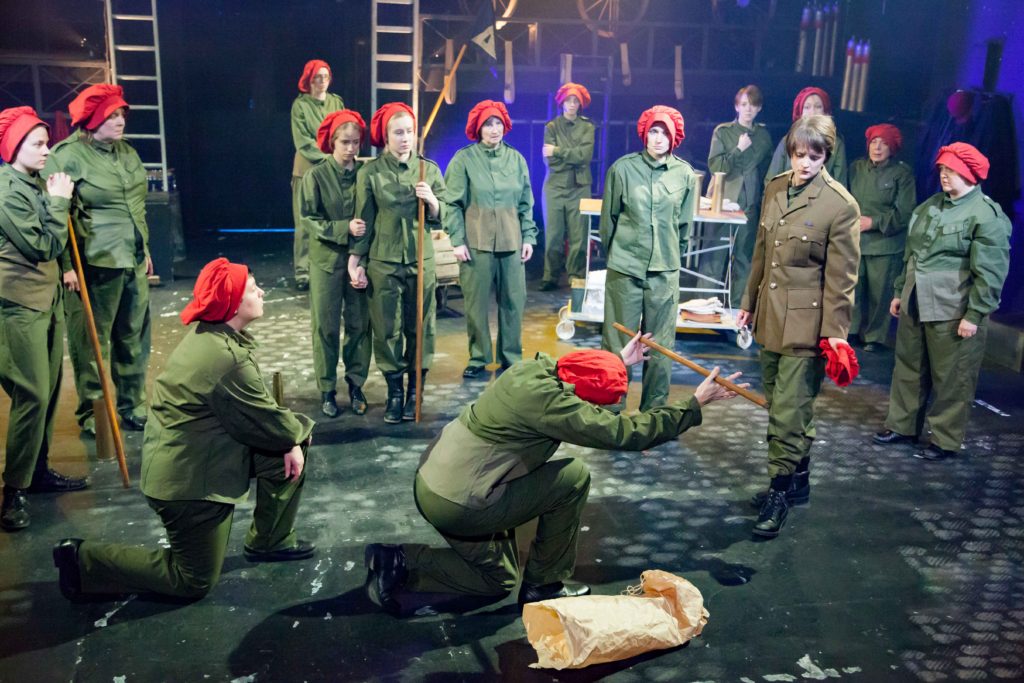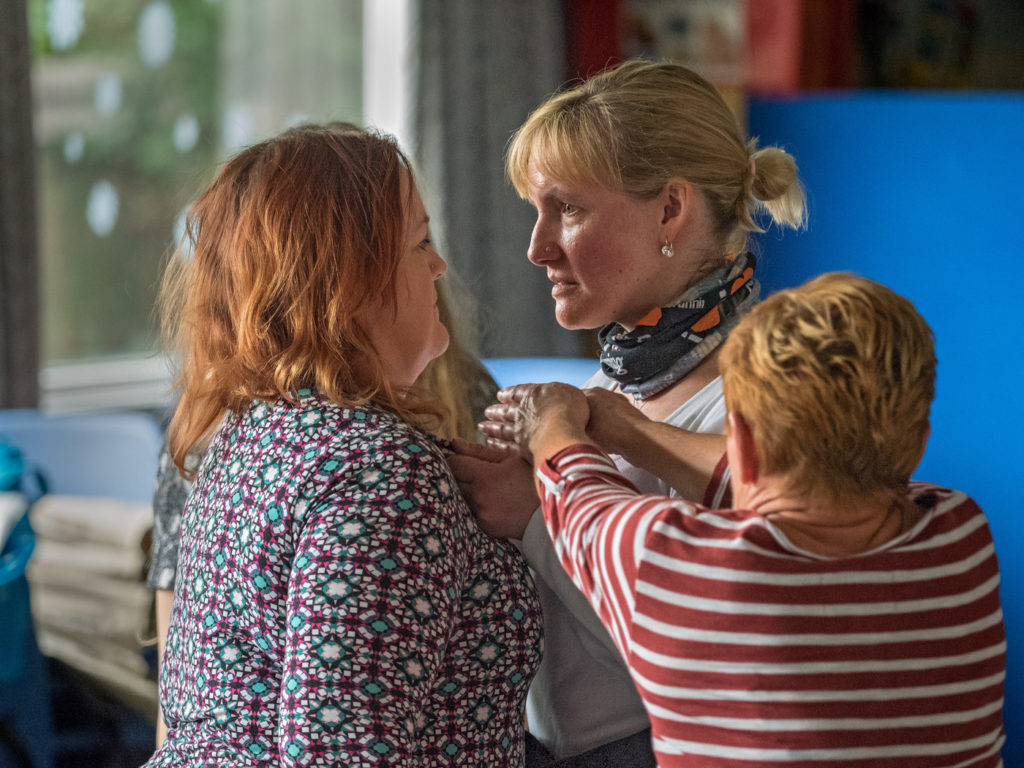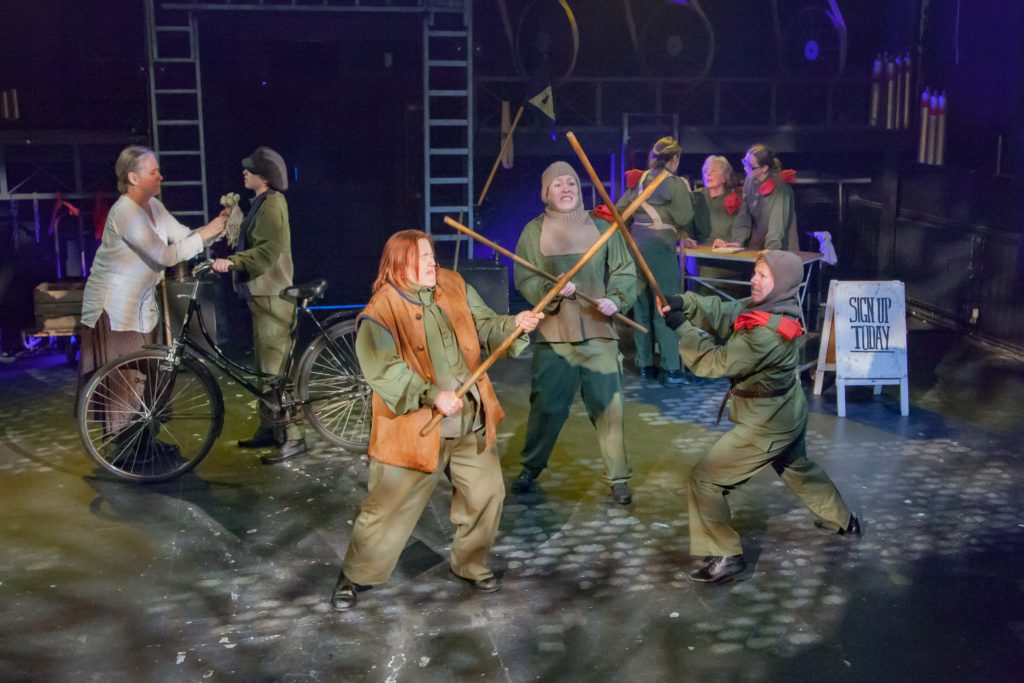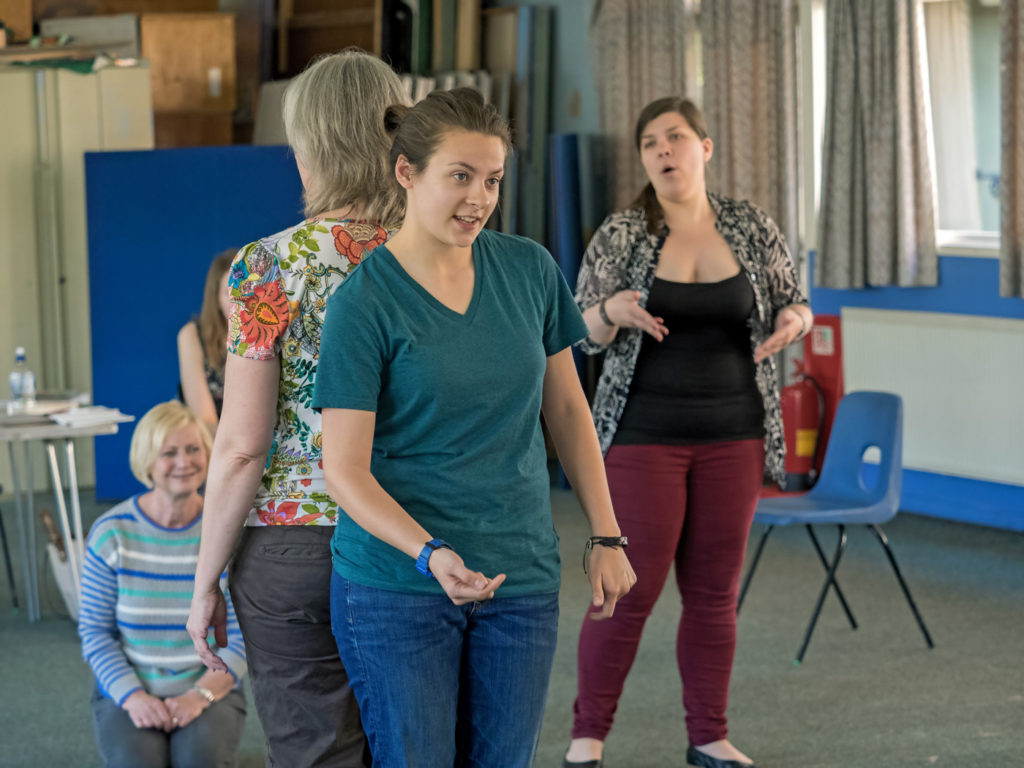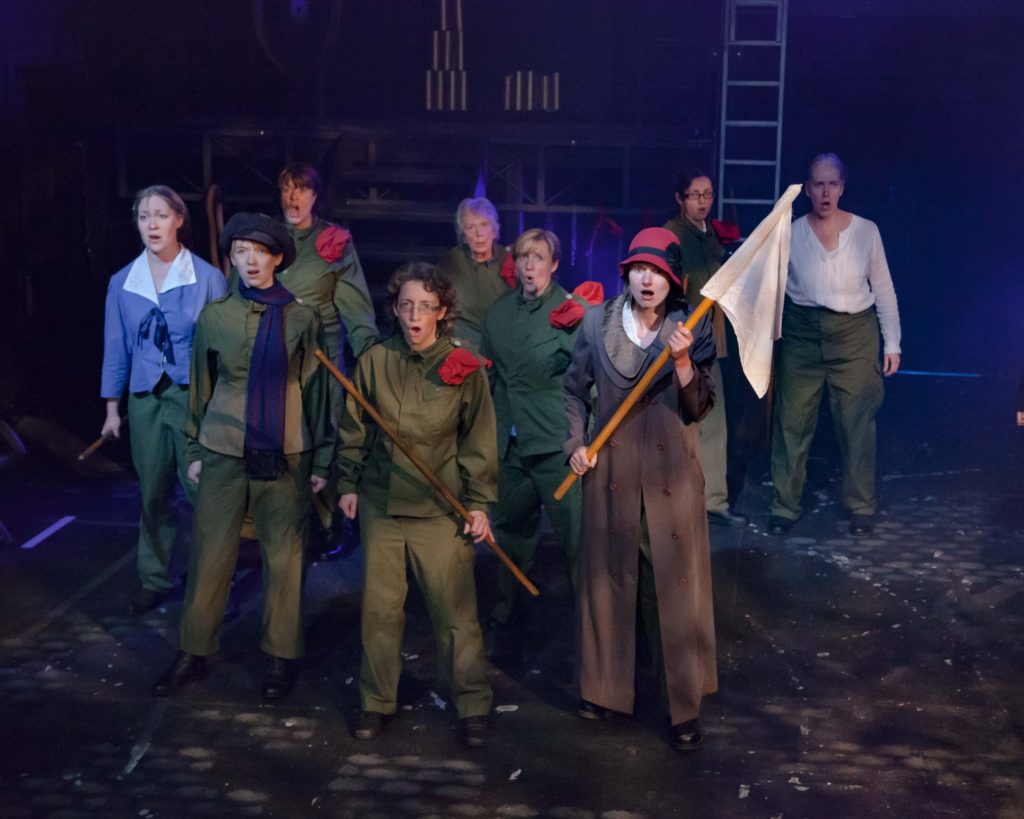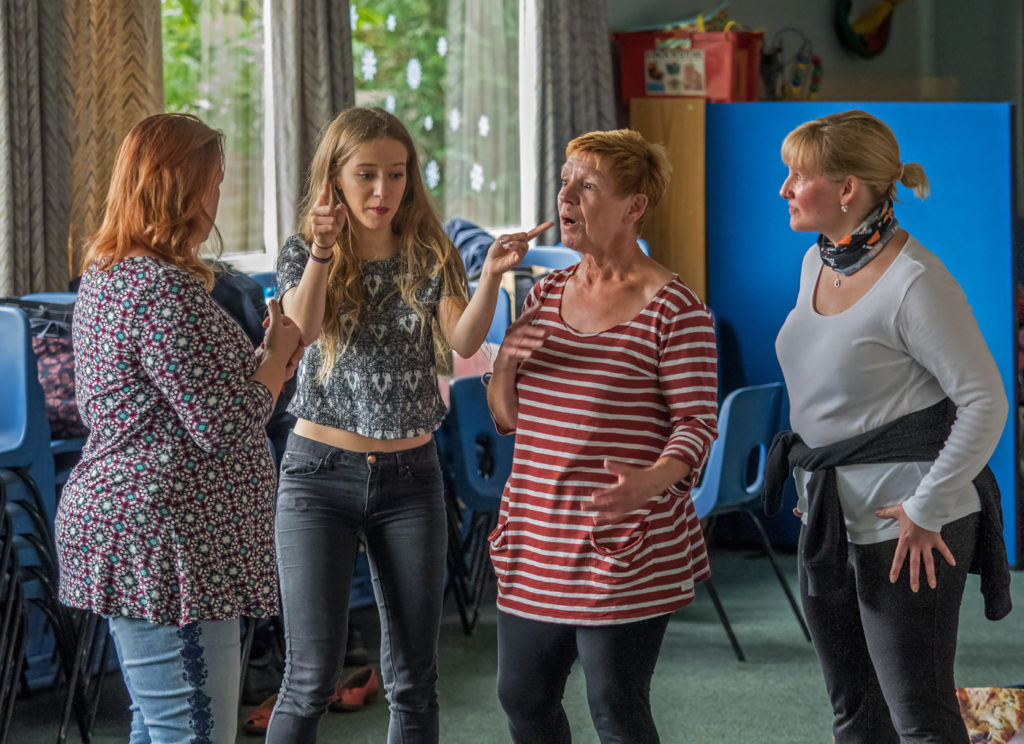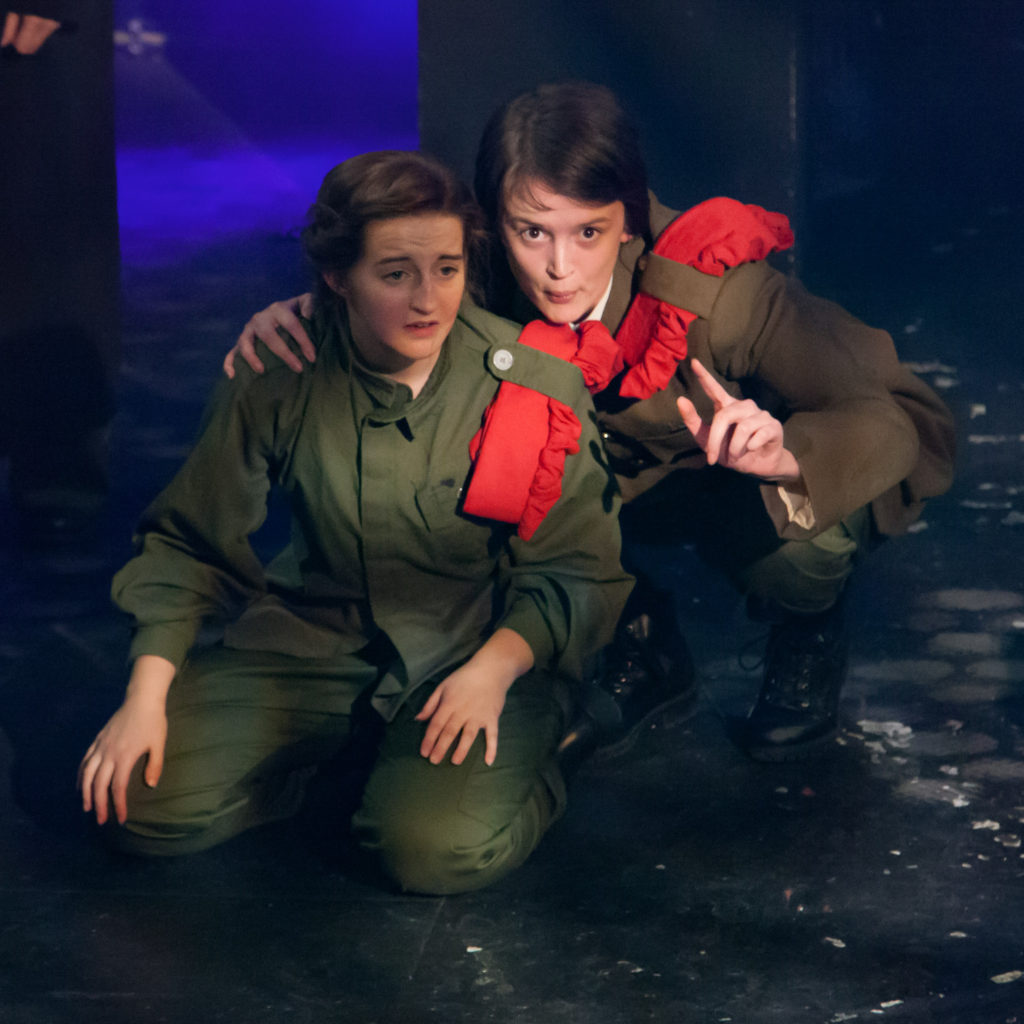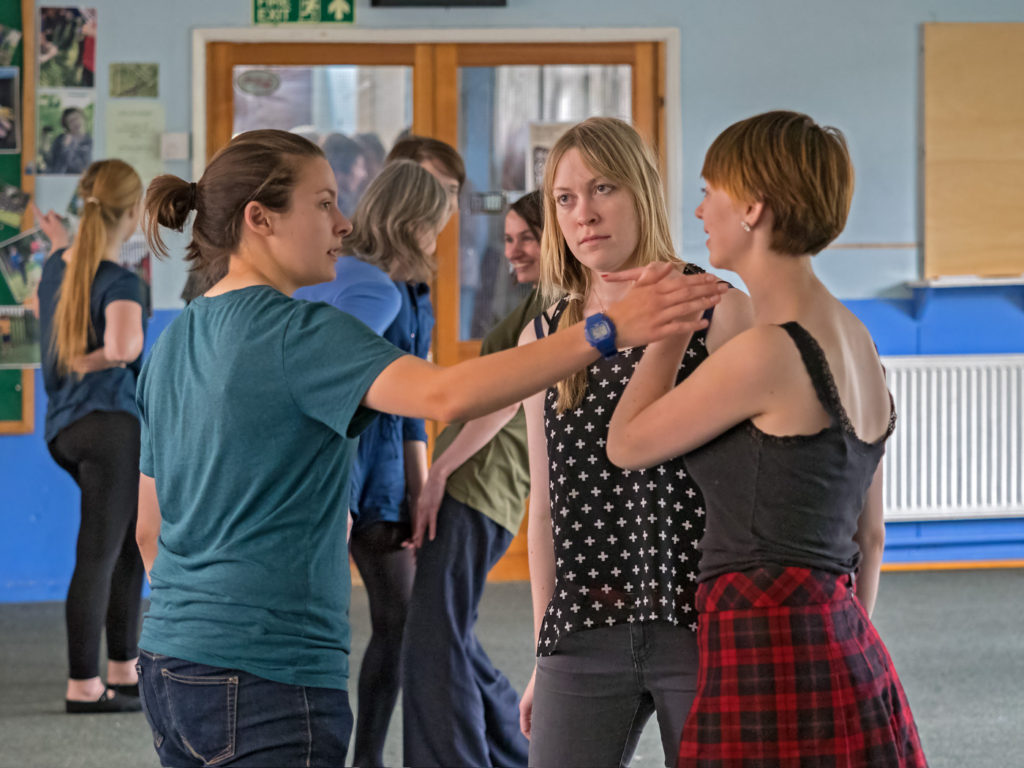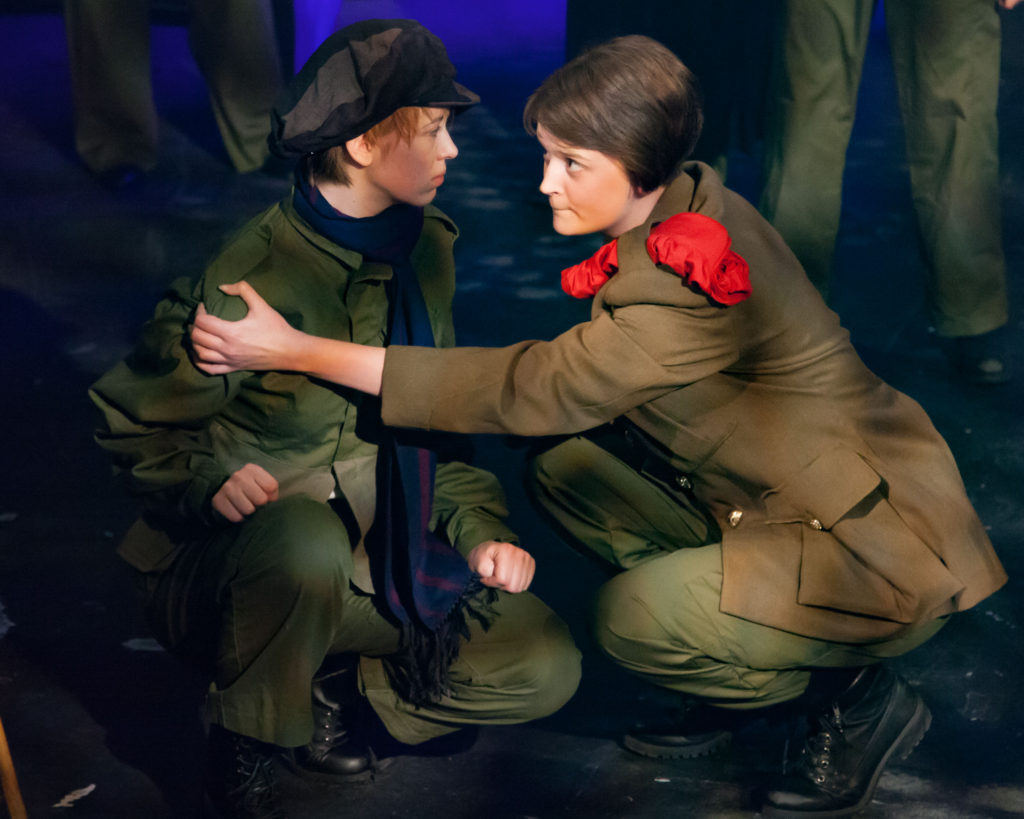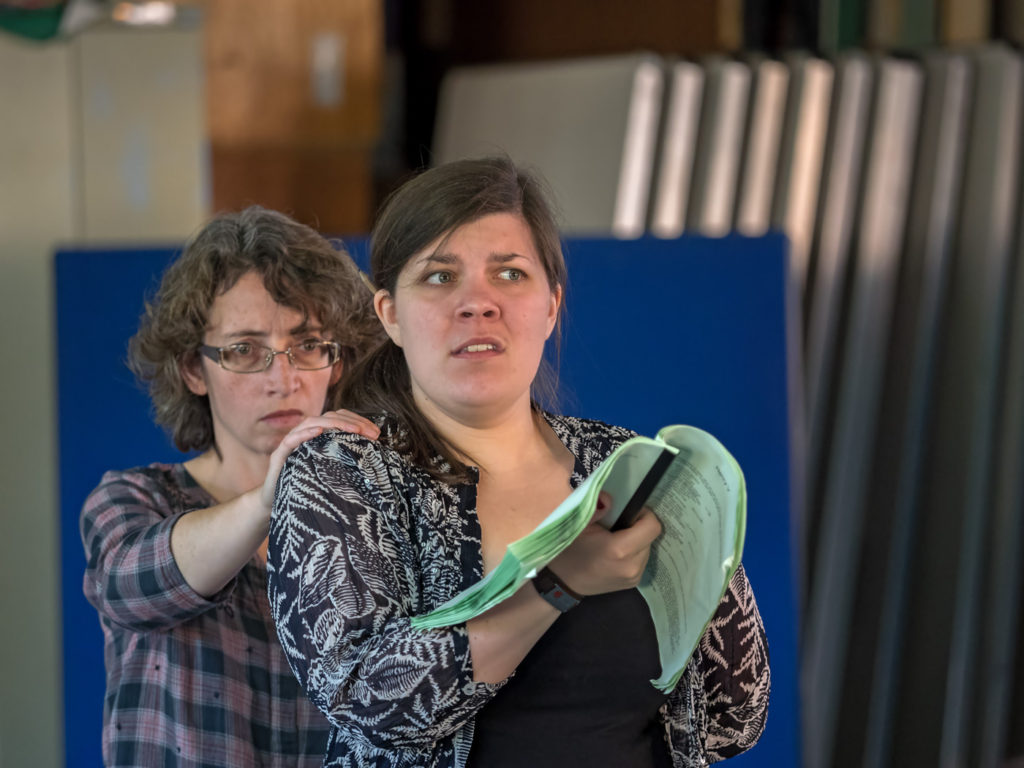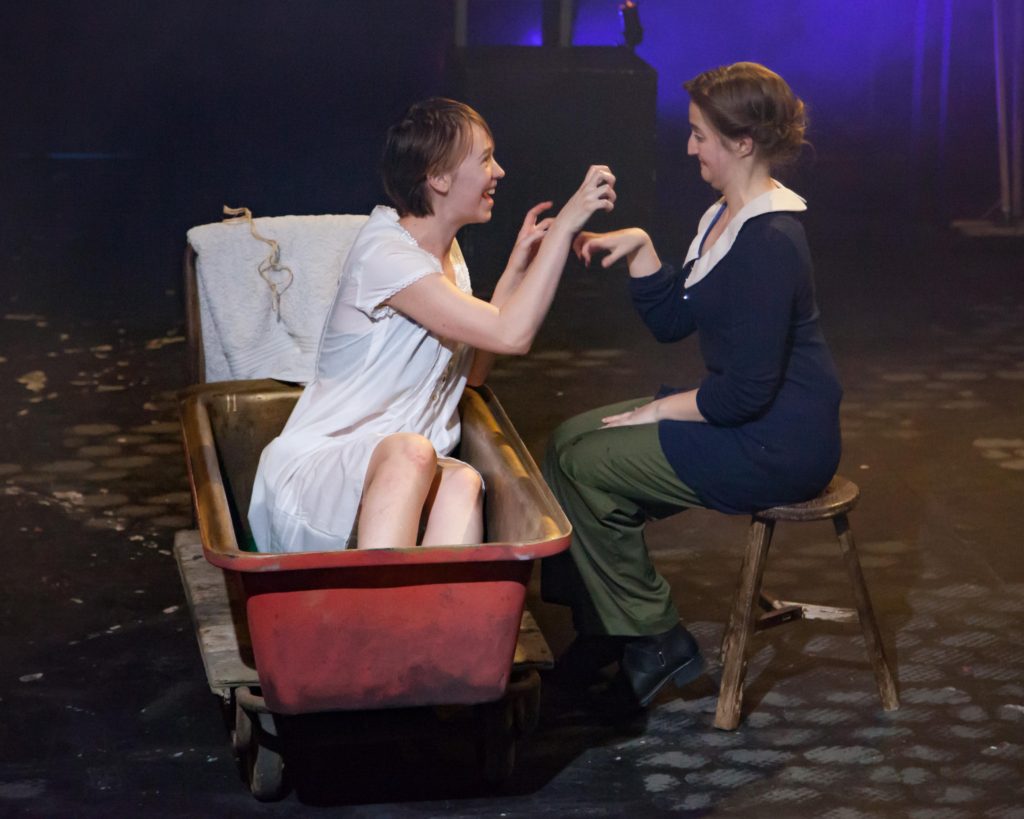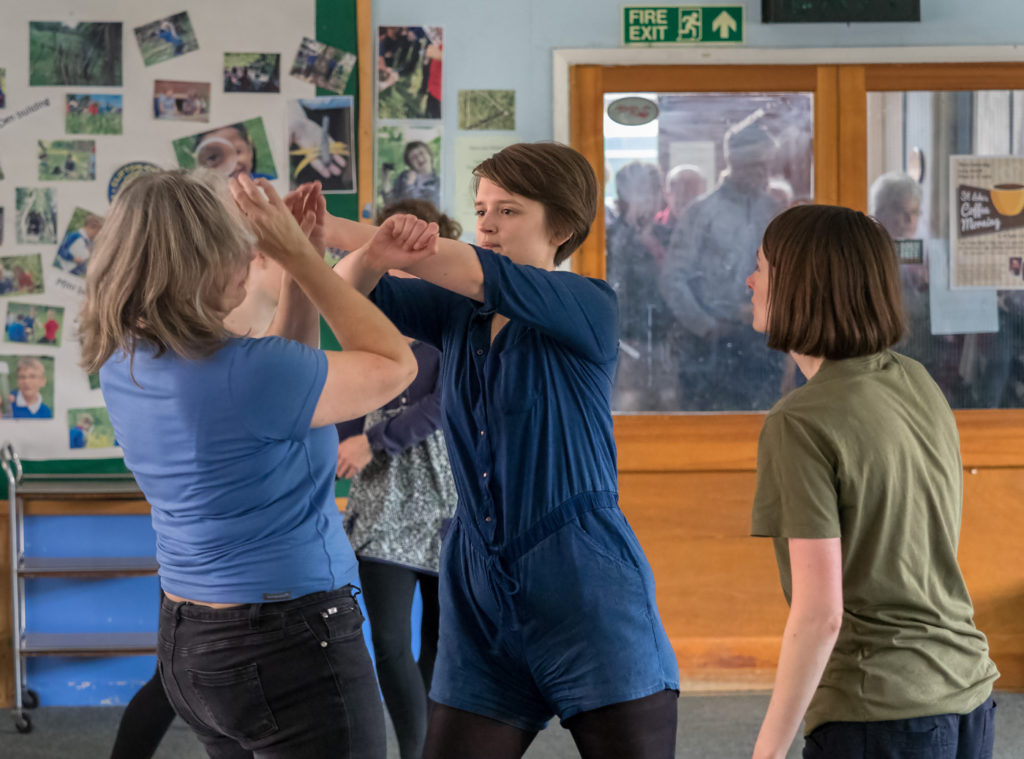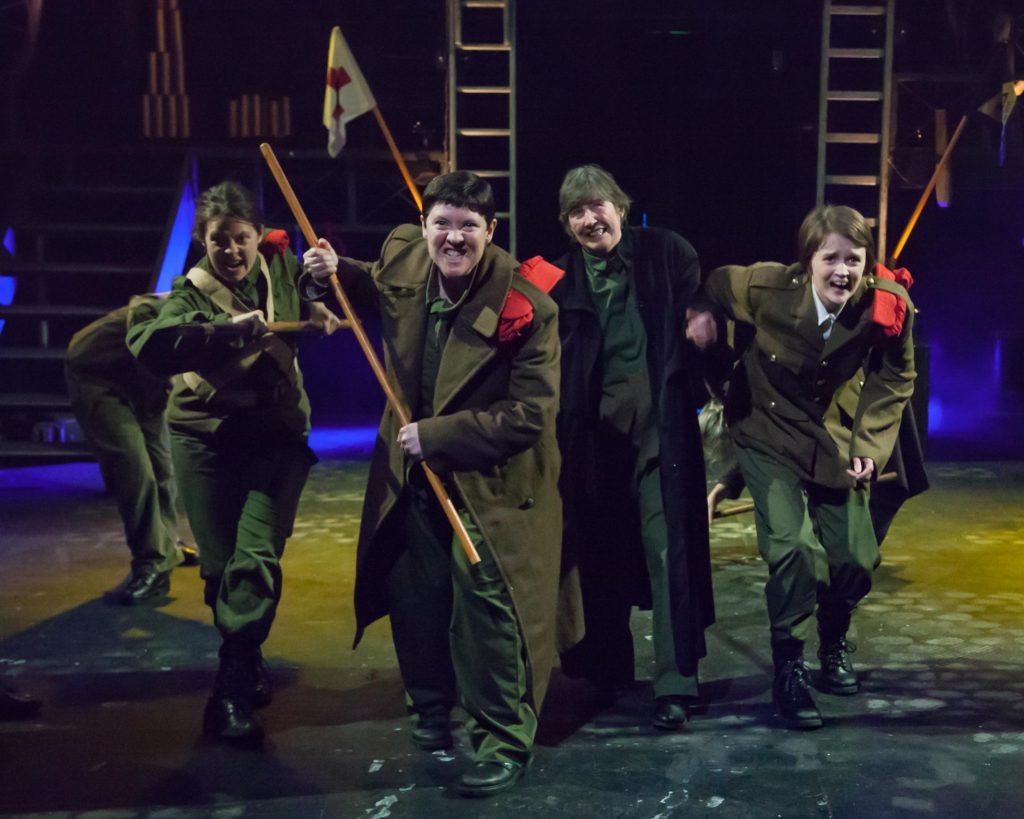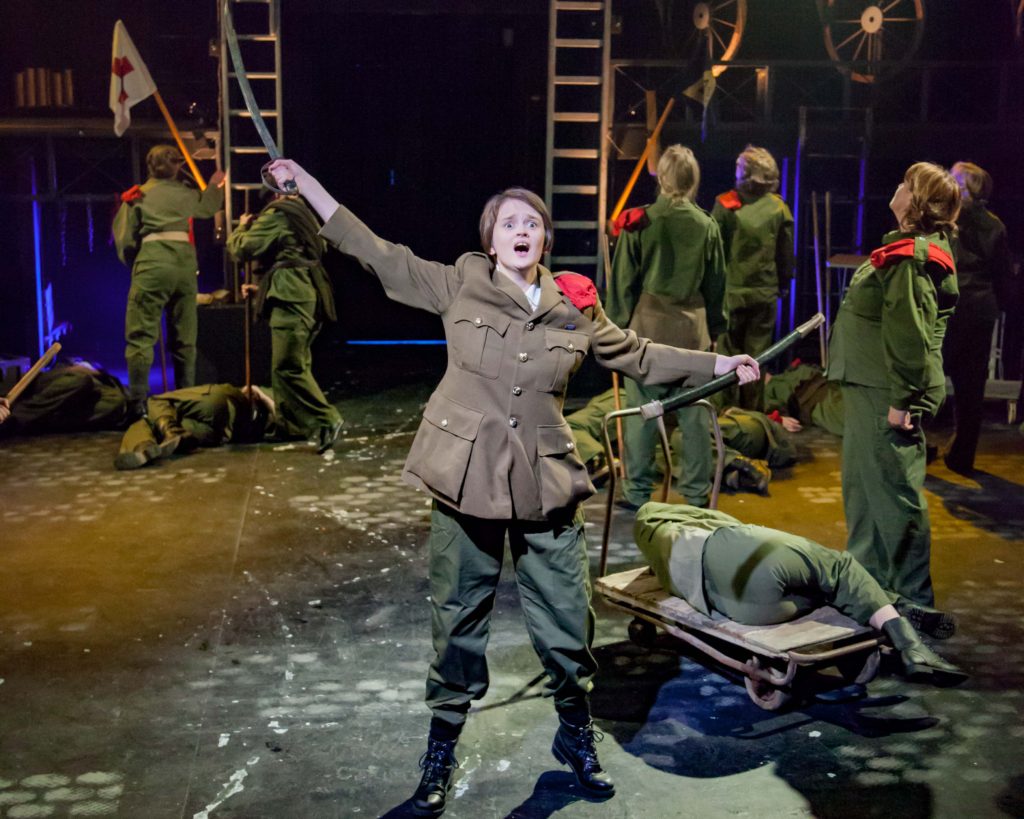Henry V
Performed at Upstage Youth Theatre, Monkgate, York 21-31 October 2015
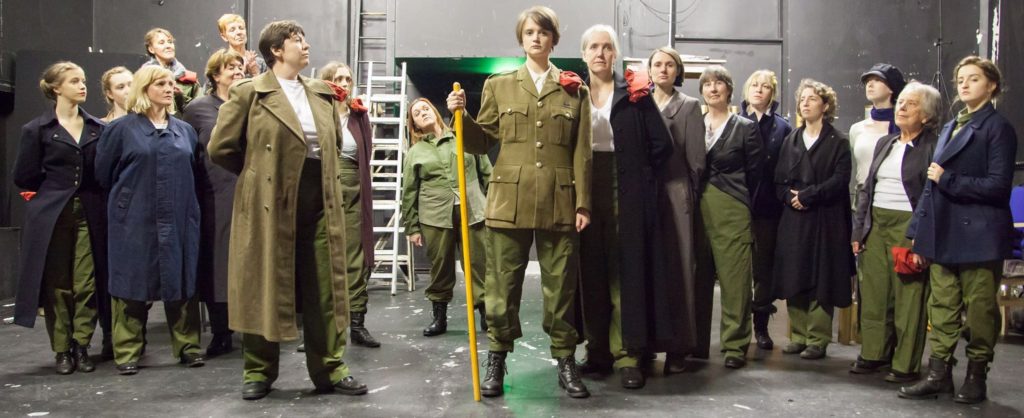 This, our 28th play and our first all-female production, was set in the WW1 Barnbow munitions factory in Leeds, as its workforce re-enacted one of Shakespeare’s best-known plays and explored the impact of war. It was performed during the period covering the 600th anniversary of the battle of Agincourt, commemorating both that historic conflict and the 1915 sacrifice of the munitions workers at Barnbow, killed in a disastrous explosion at the factory..
This, our 28th play and our first all-female production, was set in the WW1 Barnbow munitions factory in Leeds, as its workforce re-enacted one of Shakespeare’s best-known plays and explored the impact of war. It was performed during the period covering the 600th anniversary of the battle of Agincourt, commemorating both that historic conflict and the 1915 sacrifice of the munitions workers at Barnbow, killed in a disastrous explosion at the factory..
The director, Maggie Smales, wrote: ‘Henry’s aspirations take a nation to war. His court is hungry for it regardless of the consequences and costs. From the humblest to the highest, the play gives us moments of paralysing fear and redoubtable courage …
‘Not only those on the battlefield experience these extremes of human experience. The women and men who worked in the dangerous environment of armament factories all over Europe lived daily with the fear of death, had families for whom they had to care daily, waited anxiously for news of their loved ones fighting abroad. Their courage had to be maintained day after day, shift after shift. Their fear had to be hidden from others.’
Charles Hutchinson of the York Press chose the production as his ‘York Play of the Year’ for 2015, describing it as ‘… moving, political and potent’ and ‘YSP’s best show yet’. Congratulations to Maggie, her cast and crew. Read Charles’ review below.
Production photographs by Mike Oakes. Rehearsal photographs by John Saunders.
The crew produced our first ever video trailer for this show:
The Cast
Henry – Claire Morley
Lord Scroop, Constable, Court – Kathryn Addison
Hostess, Westmoreland, Bates – Elizabeth Elsworth
Duke of Burgundy, Governor of Harfleur – Margaret Hillier
Le Fer, Orleans, Queen Isabel – Imogen Little
Exeter – Elizabeth Lockwood
Boy, Katherine – Lily Luty
Dauphin, Gloucester – Karen Millar
Erpingham – Sally MItcham
Archbishop of Ely, Thomas Grey – Beryl Nairn
Bardolph, King of France – Rachel Price
Pistol – Rosy Rowley
Alice, Cambridge – Beth Sharrock
Messenger, MacMorris – Sarah Jane Strong
Salisbury, Gower – Alison Taylor
Fluellen – Emily Thane
Nym, Archbishop of Canterbury, Williams – Shirley Williams
Montjoy – Charlotte Wood
Duke of Bedford – Diana Wyatt
The Crew
Director – Maggie Smales
Assistant director – Becky Thomson
Producer, Stage management – Sandrine Carlsson
Movement director – Sarah Cotterill
Deputy stage manager – Izzy Carrick
Script coach – Barbara Carlson
Production assistant – Katy Hoste
Lighting – Sara Burns
Sound – Mike Redley
Technical operator – Edward Dick
Set build – Mike Rogers/Martin Parvin/Jamie Searle/Dave Peacock
Properties – JeremyMuldowney/Katy Hoste/Chloe Mercer/Julia Smith
Costume – Julia Smith
Marketing – Ned Hoste/Beryl Nairn/Rebecca Thomson/Claire Morley
Photography – John Saunders/Michael Oakes

In the York Press, Charles Hutchinson wrote:
‘FOR York Shakespeare Project’s 28th show on the road to presenting all 37 over 20 years, the committee announced it would be the community project’s first all-female production.
‘From 25 pitches, director-designer Maggie Smales won the day with her suggestion to set Henry V during the First World War at the Barnbow munitions factory, just outside Leeds, to mark both the 600th anniversary of the Battle of Agincourt as well as the on-going reflections on the Great War. As many as 18,000 Yorkshire women and girls worked at Barnbow, plenty of them from York.
‘We are accustomed to Shakespeare’s plays being pulled and pushed this way and that in pursuit of resonance, relevance and new insights, and YSP’s cast, director and production team emerge as triumphant as King Harry, as they explore the meaning of war through Shakespeare’s discourse.
‘Smales has the Barnbow lasses in uniform march briskly past the chattering bar and up the stairs, called to order to start their daily shift with banter and wartime factory songs; a scene through which audience members must walk to take their seats after passing wartime posters on their ascent.
‘Smales has the stage facing the opposite way to usual, towards the single exit, with a bank of scaffolding and minutiae of the munitions factory, and the effect in this black-box studio is to make the atmosphere more confrontational. “Danger Live Explosives” reads one sign, an omen of what was to come at Barnbow in a fatal explosion in December 1916. Overhead, Sara Burns’s lighting apes myriad Yorkshire factories.
‘Suddenly, one worker solemnly carries on a package. Inside is a uniform, the symbol of loss on the Front for Claire Morley’s factory girl, who is urged by all her co-workers to put on the jacket, whereupon she becomes Henry V and now the game’s afoot. It is a brilliantly effective transformation, all the “lasses” then taking on roles that retain their original titles.
‘What comes through is our human characteristics, not whether they are male or female, and Morley, who is a natural headgirl in demeanour, captures both the idealised hero, once taken to extremis by Laurence Olivier, and Henry’s less savoury, ruthless side.
‘There are impressive performances too from Rosy Rowley’s Pistol and the gold-star emerging talents of Lily Luty’s Katherine, Charlotte Wood’s Montjoy and Imogen Little in a trio of roles, each actress handling a French accent or even French dialogue with élan.
‘Maggie Smales had wished to point up the “full spectrum of class and rank” in her interpretation of Henry V, and her thought-provoking production does indeed convey how Shakespeare’s play is “as much about the experiences of war for the people living through it as it is about those who wage it”.
‘This assertion peaks in one of the most moving moments in YSP’s 13 years as Henry V’s declamation of the list of the dead at Agincourt fades out, to be replaced by the Barnbow munitionettes walking off stage one by one as they name those who died in the 1916 factory explosion. What a fitting memorial to the oft forgotten Yorkshire women who sacrificed their lives.’


